Voices of Change: Testimonials from the Participants of the Peer School for Mental Health
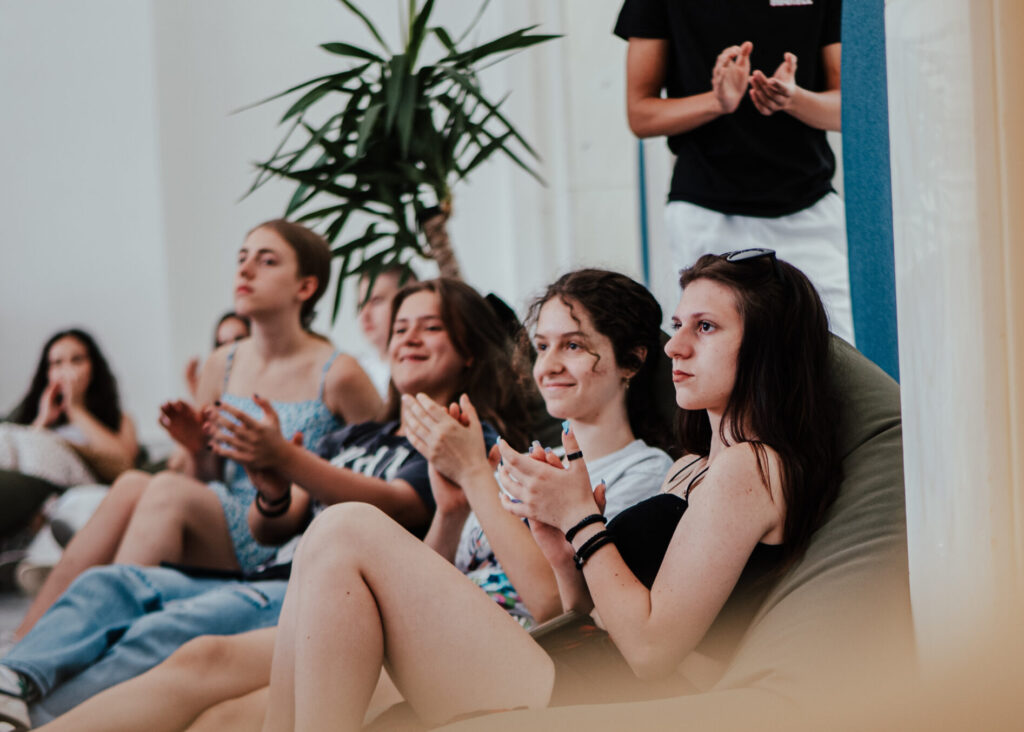
Latest News Voices of Change: Testimonials from the Participants of the Peer School for Mental Health Nata Marija Seshic – Elementary School, Gjorgi SugarevI am Nata Marija, and I was part of the Peer School for Mental Health of Children and Youth. Through communication and socializing, I learned how to deal with anxiety and panic attacks, as well as how to stay calm when giving a speech in front of an audience. In addition to learning new skills, I met and made new acquaintances and friendships. That’s why I highly recommend being part of the activities at YMCA Bitola. Andrea Grozdanovska – High School Student, Taki DaskaloWhen I heard about this training, the first thing I did was sign up without hesitation, and I couldn’t wait to start the meetings. This training was something new and a step ahead of just talking about how important mental health is. It was the first training that worked with young people to help them understand its importance, pass it on to their peers, and gradually break down stereotypes. It encouraged personal growth and development, working on self-confidence, building healthy relationships, etc. For me, this school was very interesting because at every meeting there was a different atmosphere—positive, fun, but at the same time calm. We often gathered in a circle and shared various experiences, where we felt heard and accepted as we were. During the few months that the school lasted, I slowly changed some of my thoughts and attitudes, realizing more about myself and how to keep my mental health in good shape. I gained good socialization, made many new acquaintances, and got rid of the fear of public speaking. Furkan Metliku – Elementary School, Goce DelchevI had a very good time at this school. I learned something at each training session and realized what I needed to change about myself. From all the trainings held, I shared what I learned with my close friends. Emilia Ilievska – High School Student, Jane SandanskiI had a great time during the mental health training. I learned many things, especially how to express my negative feelings such as irritability and outbursts. Also, through these trainings, I gained more confidence in speaking to others, especially when presenting in front of a crowd. I believe this training has helped me a lot in my daily life, and I recommend everyone attend at least one such training because it will help them a lot. Sara Petrovska – Student, Music AcademyThanks to the Mental Health Peer School, I became a peer educator. I managed to give a lecture on resilience to about ninety pupils and students. Our preparation for this lasted 12 teaching hours, during which we worked on several topics that contained both theoretical and practical parts. We studied and worked with the help of psychologists, for which I am very grateful. Today, I know much more, I have improved myself, and the knowledge will serve me in everyday life. I believe we should have more workshops of this type and speak out in order to help, educate, and grow healthily—as we have now. Jovana Talevska – High School Student, Dr. Jovan KalauziThis was the perfect opportunity to first learn to identify my own emotions, then learn techniques and methods that will help me make the most of them, and finally be able to apply all of that to help and support my peers. Sara Gjorgjievska – Elementary School, Goce DelchevI am so happy that I had the chance to be part of this project and become a mental health peer educator myself. The friendships, experiences, and knowledge I gained will stay with me forever, and I am very grateful for that. I hope that in the future, I will again have the chance to further develop in the field of mental health and peer education. Viktorija Jovanovska- International Slavic University, Faculty of Psychology The Peer Educator School, organized by AMOS, YMCA, and Poraka Nova, took place at the Youth Center in Bitola. Initially, I heard about the school from acquaintances, but I wasn’t exactly sure what it was about. A few days later, my dear professor, Sašo Kočankovski, sent me more information about the event, and then I knew it was something that would be really useful to me and definitely worth participating in. The things we are learning in the school are applicable and well-explained, so anyone from any field can understand them, use them for their own benefit, and then share them with their close ones and peers in a simple and understandable way. I would recommend to all young people to participate in such events more often in order to exchange opinions, meet new people, and discover different perspectives. This would contribute to their personal growth and development, and then to the development of the community. Read more about the event: Peer School Against Peer Violence – YMCA.mk
Final Promotional Event of the Peer School for Mental Health
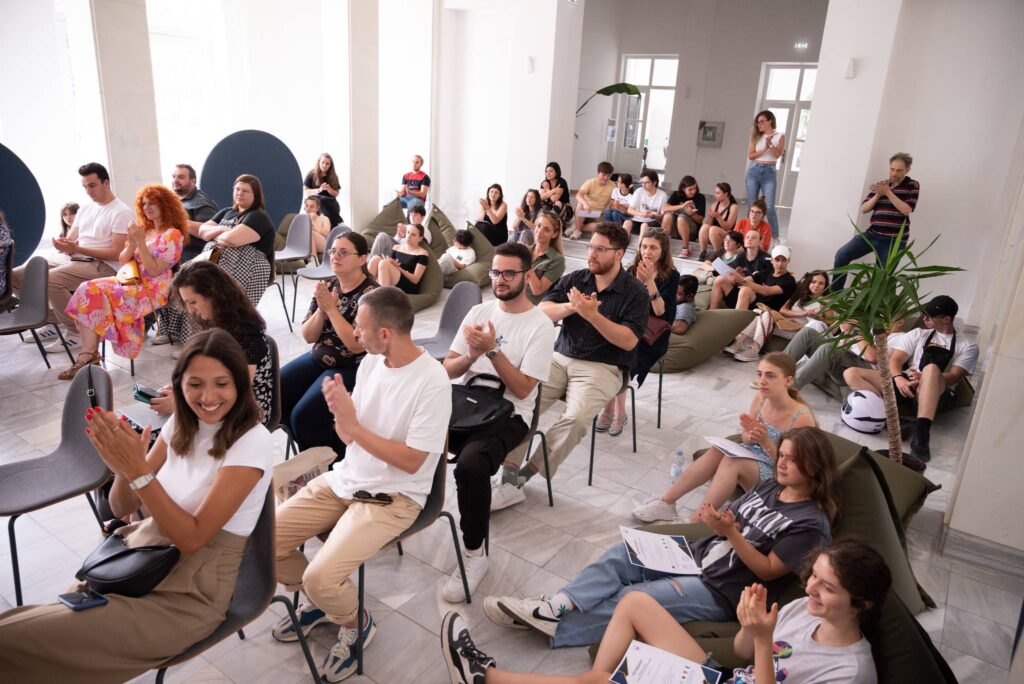
Latest News Final Promotional Event of the Peer School for Mental Health On June 26, after the completed education of peer educators and the largest peer education held on the importance of mental health in Bitola with a coverage of over 2000 students from elementary and secondary schools in Bitola, as well as in several faculties, the final promotional event of the project. It was a several-hour event, which consisted of presenting the project results, but also a presentation of the additional intellectual and creative results that resulted from the project activities. The promotional event began with a presentation of the steps and phases through which the project moved and how all the modules were through which children and young people from primary, and secondary schools and students were organized. The discussion was opened by Viktor Iliev, president of YMCA Bitola, followed by Prof.Ph.D. Sasho Kochankovski about how the atmosphere was built among the participants of the peer education modules and the social impact that was realized on the involved educators. In this section, the work of the two support groups (groups for persons with disabilities in the family and groups for single-parent families) was shown. The coordinators who led the groups, Renata Dimanovska for the group with single-parent families and Martina Durljanova for the group of families with persons with disabilities, gave presentations for them. Then the manual was shown according to which the work modules for children and young people, as well as for vulnerable groups, were conducted. The explanation for the manual was given by Jovce Krsteski, who in cooperation with Prof.Ph.D Sasho Kochankovski was preparing the appearance of the manual. Before awarding certificates for completed peer education modules, a group of peer educators who have been actively preparing in the past period performed in front of the present audience with their musical score. From the mental health topics they worked on the past year, they created their text and under the guidance of Jasna Dimitrovska, they managed to create their melody for that text and sang their entire idea in front of the audience at this final event. In the end, there was the awarding of certificates of participation and the sharing of gratitude to everyone who participated and helped this project throughout the year. The Mayor of the Municipality of Bitola, Toni Konjanovski, also addressed some of the young people who participated in the activities, as well as participants from the support groups who emphasized the need to continue this type of activities in the city, because there is no enough for this type of work with marginalized groups. offer at the level of the Municipality of Bitola. The event took place on the premises of Europe House in Bitola, where most of the peer educators were present, of course also their peers, parents, some of the professional services from the schools, representatives of civil society organizations, and representatives from the municipality. The representatives from the Municipality gave words of praise for the invested effort, work, and energy for this project to be completed properly and to contribute to enriching and encouraging interest in this issue at a higher and more professional level. With the publication of the manual, Bitola as a city also joins the trend with its contribution to the topic of how to work with peers on topics important to their mental health and well-being. The manual is free and can be downloaded at the following link. Photos from this Activity in this gallery. The project “Peer school for children and youth mental health” of the Youth Association YMCA Bitola has been implemented in the frames of the regional program for local democracy in Western Balkans2 Reload2, financed by the European Union (EU), implemented by United Nations Development Program (UNDP). The project is co-financed by the Municipality of Bitola. The project has been implemented by the YMCA in cooperation with Poraka Nova and Amos.
Participants’ Impressions from the mental health support groups
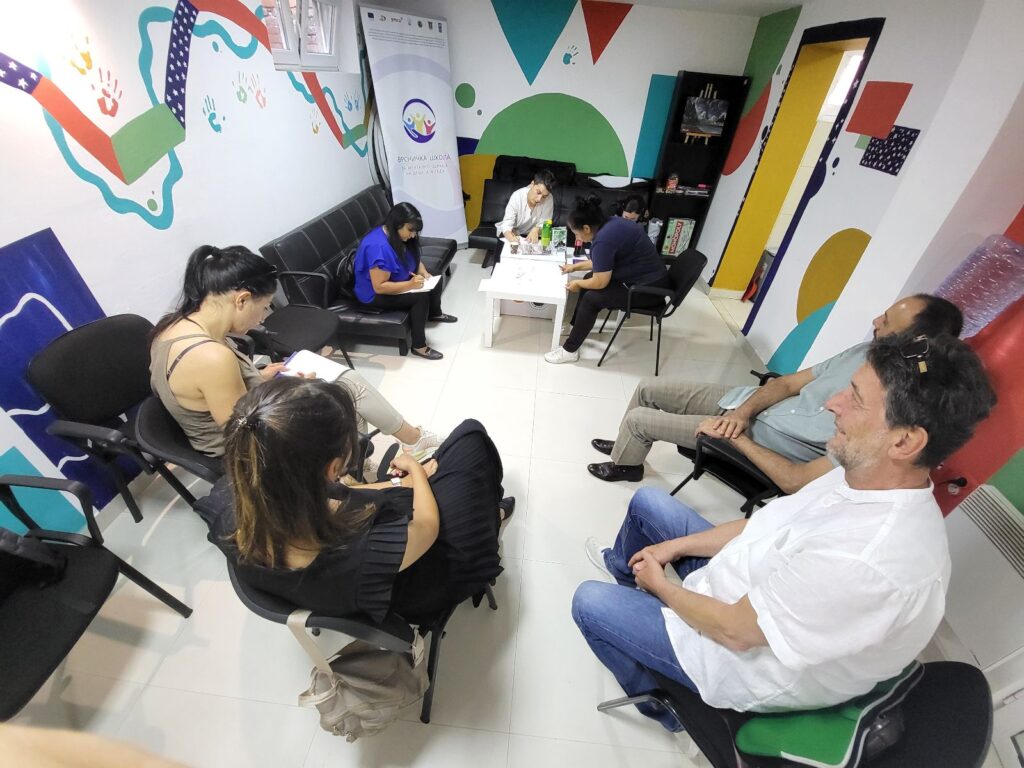
Latest News Participants’ Impressions from the mental health support groups Biljana StefanovskaAs a participant in the support group for parents of children with disabilities at the beginning we talked about the problems we face in our daily lives, something that was a familiar story to all of us, but over time it turned into mutual support and we started to we help each other, together fighting the barriers of the system in which we live. Seeing the group made up only of mothers of children with disabilities who are fighting for the welfare of the children my desire in the future together with the help of other participants and collaborators to encourage the fathers of these children to participate in such support groups is with the aim together to overcome the barriers and stereotypes surrounding the adaptation and acceptance of our children in the place where we live and to feel that this struggle is shared. Biljana StojanovskaAt the very beginning of the support groups, I had one thought going through my head, and that was that these would be like any other project we have been involved in, for the sake of order to go through the process or to have some background. However, over time I was very positively surprised by how we were accepted, allowing us to share our problems, and for which we received specific directions to find the root of that problem if we could, or to learn to solve it with appropriate techniques, master or reduce the difficulty of our problem. The group, the members, the collaborators made us feel special as individuals, and not only as parents of children with special needs. In the future, I would like to involve the whole family in this project, i.e. the fathers, as well as the brothers and sisters of the children with special needs, and together we can overcome the problems that occupy us every day. Jasmina GelevskaThis year, for the first time, I joined a support group for parents who have children with disabilities. It was a wonderful experience from which we became more positive people, we received a lot of support, advice, and courage and realized that we are worth more and worth fighting for. All participants have become like one family and our association will continue in the future. We have created a strong bond with the help of the professionals and we are grateful to them for that. I invite all people who are facing this kind of problem not to hesitate and get involved in such groups because together it is easier and we can do anything. My motto: We have no choice to choose, we must fight for ourselves and our loved ones. Bojana ArtinovskaI didn’t know what to expect, it’s my first experience with psychologists. I just knew I had to face my truth. Fortunately, I quickly gained confidence and felt safe in the group. I was able to face more fears and learned to share and at the same time be there for other members of the group ie. to listen. I learned a lot about mental health through theoretical lectures, but the experiential Gestalt exercises helped me to find answers very quickly and opened the possibility for further work with myself. The biggest benefit I think is that I learned to consciously approach problems, knowing that there is a solution, I just have to look at it from a different perspective. Recognizing a problem helps me personally, but also the feeling of support and compassion in me is now more pronounced when I see it in another. I encourage anyone who finds himself or herself in this predicament to join if they can. I think accepting help is one of the hardest things we all have to learn. This was a wonderful experience for me and I am infinitely grateful.
An overview of the activities of the support group for single-parent families
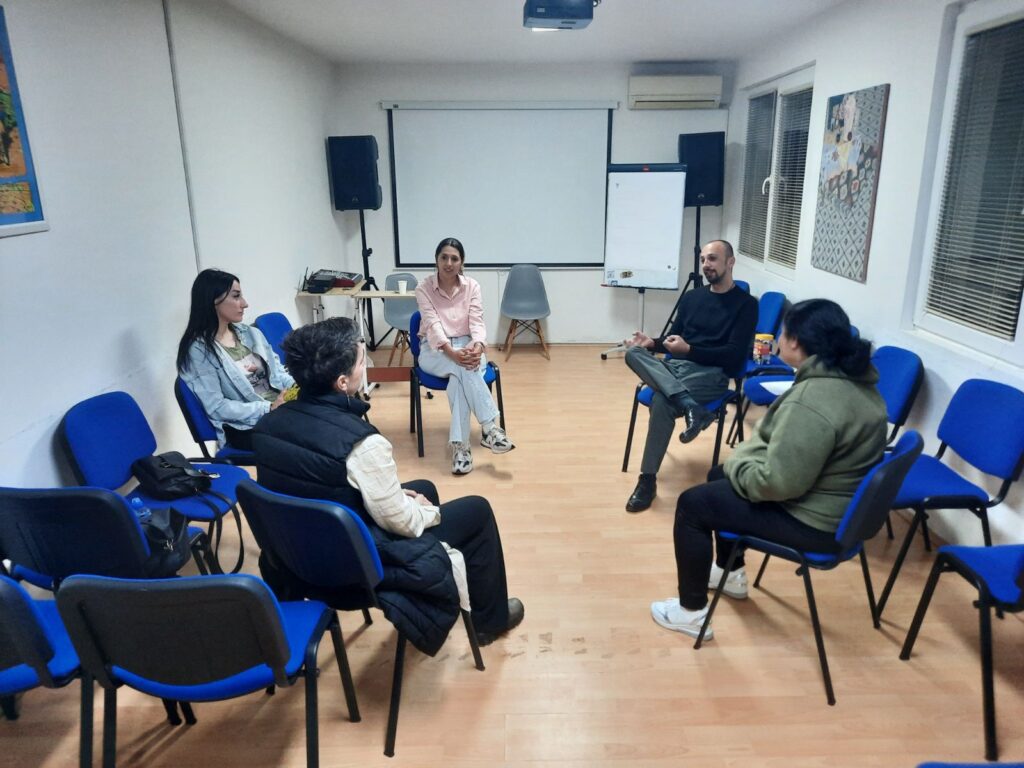
Latest News An overview of the activities of the support group for single-parent families By Renata Dimanovska Reflecting on the past six months of leading our support groups, I am filled with a deep sense of gratitude for the incredible journey we have shared. When we started this activity, my colleague Ljupco and I had a leading motive to create a safe space, free from prejudices, where everyone can openly discuss the difficulties they face daily and the ways they can deal with them. Together, we have cultivated a community where every voice is heard and every story is valued. We witness profound moments of vulnerability, resilience, and growth. Members bravely shared their experiences, finding not only support but strength to face their challenges. And most importantly, our discussions fostered empathy and connection, reminding members that they are not alone in their struggles. The tools and insights gained here have encouraged members to make meaningful changes and approach their challenges with renewed hope and confidence. Over the past few months, a wide range of mental health topics have been covered, including: What is mental health and how to take care of it, what exactly is anxiety and how to deal with it, the occurrence of panic attacks, and techniques for coping, post-traumatic stress disorder, trauma and working with a traumatic event, challenges of modern parenting, parenting styles, communication styles, resilience, and many other topics. I must emphasize that most of the topics were followed by experiential exercises that also helped the participants experience what we discussed. We are grateful to our participants for being a part of this journey and for making the past six months truly transformative. The project „Peer school for children and youth mental health“ of the Youth Association YMCA Bitola has been implemented in the frames of the regional program for local democracy in Western Balkans2 Reload2, financed by the European Union (EU), implemented by United Nations Development Program (UNDP). The project is co-financed by the Municipality of Bitola. The project has been implemented by the YMCA in cooperation with Poraka Nova and Amos. For participant’s impressions, you can read here Photos from this Activity in this gallery.
An overview of the activities of the support group for parents of children with disabilities
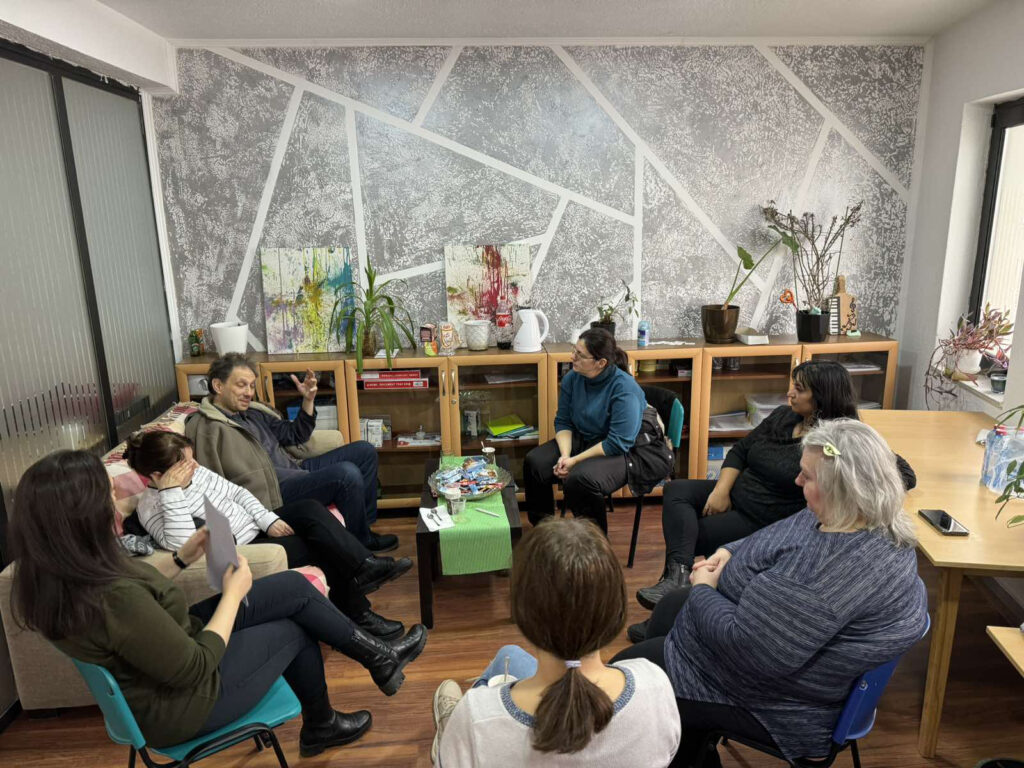
Latest News An overview of the activities of the support group for parents of children with disabilities By Martina Durljanova Our support group is a “Respite Group” as parents of children with disabilities often call it. It’s about hero parents, who left themselves far behind others, in the ravages of time, to be the backbone of the family. But that’s what every parent does, right? However, the parents of children with disabilities do not only have the burden of the family but also the burden of invisible community barriers, the burden that society makes to make their difficult situation even more difficult, the non-acceptance of the extended family, the separation from all social gatherings, events and socializing. Thanks to the “Peer School for Mental Health” project, we opened a support group where space was opened not only for socializing but also for psychological support and a place where the darkest sides that were hidden for a long time in these parents are revealed, topics that they never had the opportunity to discuss. To talk, directions they didn’t know could be opened and conversations they didn’t know could happen. Through the twelve meetings that started in November of last year until June of this year, we discussed numerous topics. We started with mental hygiene as a topic, so after the mental cleansing we continued to delve deeper into new topics and discover the dark sides of endurance (the expected and assertive one), how it gives rise to anxiety and depression, quiets self-esteem and all this contributes to the stress in everyday life increases so that in the end they cannot cope with the (lack of) support and (lack of) acceptance from the environment and institutions, but also the most difficult thing, the support from the family, which they rarely have. And that whole process is repeated constantly, with every new incident, outside or at home, with every single event related to the child. Fortunately, we have created a comfort zone, where parents are eagerly waiting to come and talk about new topics, but also to return to some of the old ones, because every day is a new story, a new challenge that they currently have to face, so with the help of the psychologist, they discuss them, go into details about how they felt then at that moment, and how they feel now while they are telling. And let’s not neglect the support from the group itself, which helps each other to deal with problems more easily. The desire of the parents to continue leading the group even after the end of the project is great, so we would not stop here but would continue to move at the same pace and further to meet their needs. The project „Peer school for children and youth mental health“ of the Youth Association YMCA Bitola has been implemented in the frames of the regional program for local democracy in Western Balkans2 Reload2, financed by the European Union (EU), implemented by United Nations Development Program (UNDP). The project is co-financed by the Municipality of Bitola. The project has been implemented by the YMCA in cooperation with Poraka Nova and Amos. For participant’s impressions, you can read here. Photos from this Activity in this gallery.
Peer Education for Mental Health Throughout Schools in Bitola
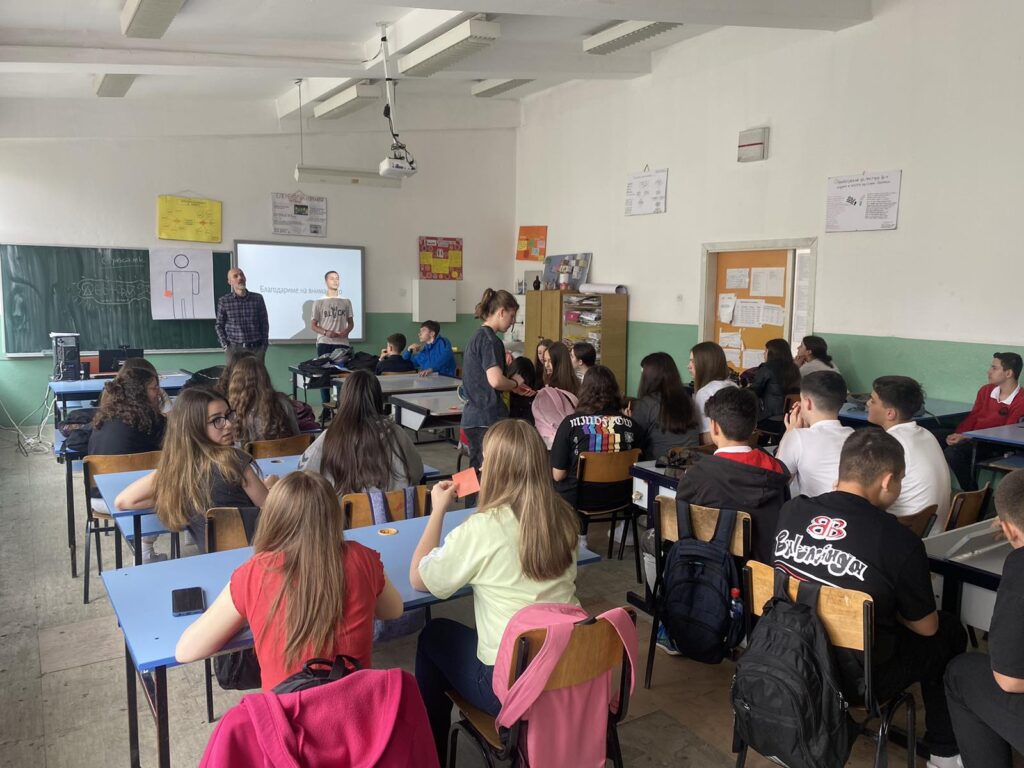
After the completion of six training modules for peer educators, the period began where already trained peer educators shared their knowledge in schools and faculties in Bitola. The workshops for peer educators were attended by 58 peer educators, and about 42 peer educators finished, 41 of whom, as the most motivated in teams, shared their presentations in the field with their peers. More than 2,000 students from almost all elementary (from 7th to 9th grade) and secondary schools, as well as some of the faculties in our city, make it the most extensive peer education conducted in Bitola. Thanks to the pedagogical and psychological services from the schools with which we were in constant communication. The presentations were well prepared by the peer educators themselves and were well received with great enthusiasm during the implementation and often had good feedback from their classmates. It was not always possible to get opinions from the listeners, but with the help of various games and activities integrated into the topic of the presentation, mental health and its importance were brought closer to a large number of young people. The period for the implementation of the presentations was relatively long and from that arose the need for the peer educators to have additional mentoring sessions. Those sessions took place in the Youth Center and were intended for those educators who had already conducted presentations and activities, so they shared their impressions in a common atmosphere with the rest. Personal stories were shared about how they felt during the presentations, what problems they encountered during the implementation, and what kind of attitude they encountered with the teachers and professional services. These meetings helped the peer educators a lot, especially those who were conducting activities of this type for the first time, but they also felt free to express themselves and learn something additional from the more experienced ones. In addition to these additional mentoring sessions, the peer educators proposed to hold additional meetings where it will be possible to participate in something creative, but also to learn something extra. From those proposals came the workshops with creative expression of the messages that the peer educators had already shared among themselves during the peer school in the past period. Here, the peer educators were offered many opportunities for self-expression through the written word, writing verses and singing. With these activities, the Peer School for Mental Health of Children and Youth reached its final stage. The project „Peer school for children and youth mental health“ of the Youth Association YMCA Bitola has been implemented in the frames of the regional program for local democracy in Western Balkans2 Reload2, financed by the European Union (EU), implemented by United Nations Development Program (UNDP). The project is co-financed by the Municipality of Bitola. The project has been implemented by the YMCA in cooperation with Poraka Nova and Amos.
Mental Health workshops for Peer Educators [module 7a and 7b]

The basic workshop modules were six, but due to the large scope of peer education and the length of the implementation period, a seventh module was needed, which was designed to support the peer educators. Therefore, everyone who needs additional strengthening in the area of work with young people and peer education had the opportunity to participate in the so-called mentoring sessions in module 7a, and all those who want to express themselves creatively on the topic of mental health had the opportunity to work on themed songs and music within module 7b. All activities with peer educators took place in the Youth Center. The mentoring sessions or the so-called 7a module were intended for those educators who have already conducted presentations and activities, so they shared their impressions in a common atmosphere with others. Personal stories were shared about how they felt during the presentations, what problems they encountered during the implementation, and what kind of attitude they encountered with the teachers and professional services. There were numerous insights, but some of them were that they were happy and satisfied and that they learned, developed, and strengthened their self-confidence. They were satisfied with the support they received from the YMCA, they expected more support from the schools and they thought it would be great to work with smaller groups of classmates. These meetings helped the peer educators a lot, especially those who were conducting activities of this type for the first time, but they also felt free to express themselves and learn something additional from the more experienced ones. Three workshops were held, the first of which was attended by the Mayor and other representatives of the Municipality of Bitola, where they were introduced to the entire project and current activities in more detail. The third meeting was an introduction to the 7b module – mental health and music imposed by peers. From those proposals came the workshops with the creative expression of the messages that the peer educators had already shared among themselves during the peer school in the past period. Here, the peer educators were offered many opportunities for self-expression through the written word, writing verses, and singing. The guest was Jasna Dimitrovska, a musician, who briefly explained to the participants the planned future activities in the mental health school for children and youth, as well as the connection between music and mental health. The participants in one of the previous modules had prepared several of their songs which were opened in this module and several workshops worked towards creating a song that will be ready for performance at the final event of this school. The project „Peer school for children and youth mental health“ of the Youth Association YMCA Bitola has been implemented in the frames of the regional program for local democracy in Western Balkans2 Reload2, financed by the European Union (EU), implemented by United Nations Development Program (UNDP). The project is co-financed by the Municipality of Bitola. The project has been implemented by the YMCA in cooperation with Poraka Nova and Amos. Read for the previous modules of workshops here.
Mental Health workshops for Peer Educators [module 4,5,6]
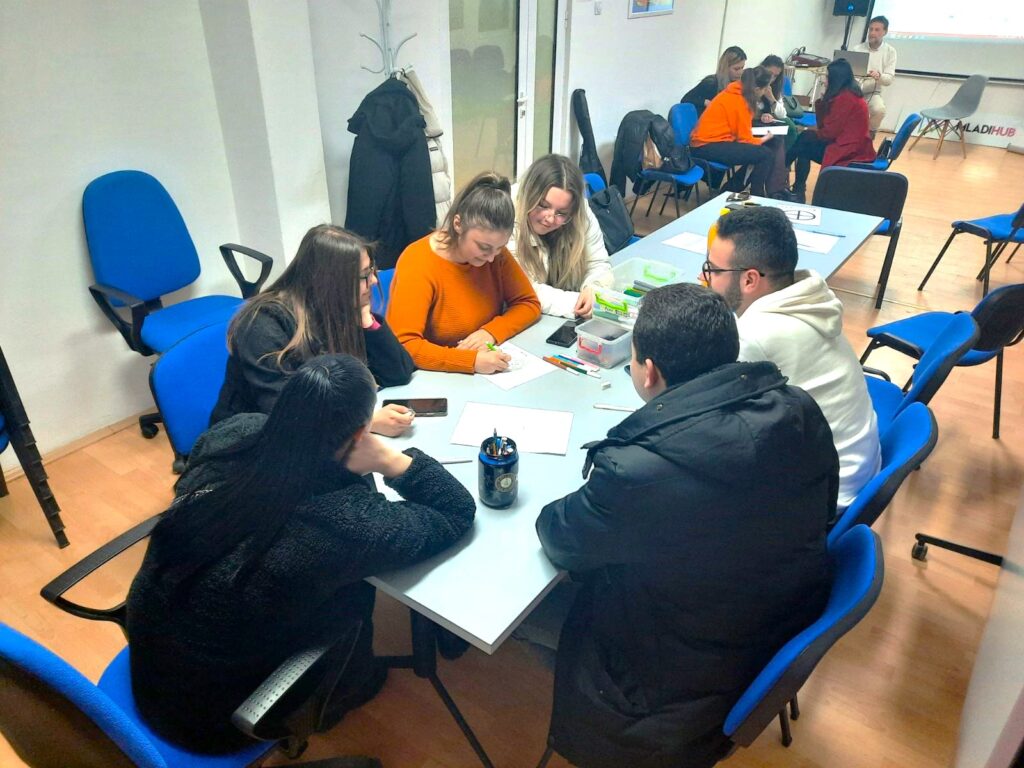
In the second semester, we continue with a new series of mental health workshops for peer educators from primary and secondary schools and faculties from Bitola. Modules 4, 5 and 6 are planned for this semester. In the fourth module, the participants got acquainted with the digital representation of the topics covered in the previous three modules – anxiety, depression, risky behavior and personal endurance or resilience. On each of these topics, it was discussed how they are perceived by young people, how young people approach them and in general how life on social networks affects and shapes the young person in our modern life and what are the positive and negative influences on our mental health. In this module, we also did an exercise for self-assessment of Internet addiction, during which we could jointly discuss the results of the findings. At the request of some of the participants who were not able to attend this training earlier in groups, we made an additional workshop for educators from all groups. This module was completed by 42 peer educators divided into 5 groups of elementary school students, high school students and faculty students who got acquainted with the manifestation of these topics in the digital sphere. With this, we have closed the section on enriching the knowledge of young people on the subject of mental health. The more interesting part followed, starting with the fifth module, which is preparation for the most beautiful part of the activities – sharing knowledge with peers on the ground in educational institutions in the city. Within it, the participants from three groups (faculty students, morning shifts and afternoon shifts, elementary and high school students) of the peer school for mental health for children and youth had the opportunity to recapitulate all the material that they went through in the previous four modules. In doing so, they perceived which of the learned topics they consider more important or useful for their young peers, or for which topic they have particular enthusiasm to share with their peers. We worked on coordination and formation of teams by schools and planning for their responsibilities for the next period. From our side, they received guidance and support on how to put together presentations and choose appropriate activities for the next phase when they will share some of the new knowledge with their peers from the schools and faculties of the city. We believe that the knowledge supplemented with practical activities will strengthen what has been learned among peer educators, and among students across the city, we will help bring and demystify the topic of mental health to everyone. This module was completed by 47 peer educators, 3 groups of elementary school students, high school students and faculty students. In the sixth and final module, we offer teams of peer educators a unique mentoring experience in a supportive environment to receive feedback on their presentations. This is where peer educators come with their presentations, share them with other peer educators and where they can try them out and practice and get feedback on the “homeworks”. This will help them to continue working on improving them in order to make the next and most beautiful stage of sharing knowledge in schools less stressful for the peer educators and more interesting for all students. Peer educators from all groups of elementary school students, high school students and faculty students who are determined to share the acquired knowledge with their peers in practice participate in this module. This module is still being implemented, the teams are being built, coordinated, working on their presentations, coming for consultations and mentoring, and as soon as everyone is ready, we will update the text with figures and the final number of peer educators and teams per school in the city. The project „Peer school for children and youth mental health“ of the Youth Association YMCA Bitola has been implemented in the frames of the regional program for local democracy in Western Balkans2 Reload2, financed by the European Union (EU), implemented by United Nations Development Program (UNDP). The project is co-financed by the Municipality of Bitola. The project has been implemented by the YMCA in cooperation with Poraka Nova and Amos. Read for the previous modules of workshops
Mental Health workshops for Peer Educators [module 1,2,3]
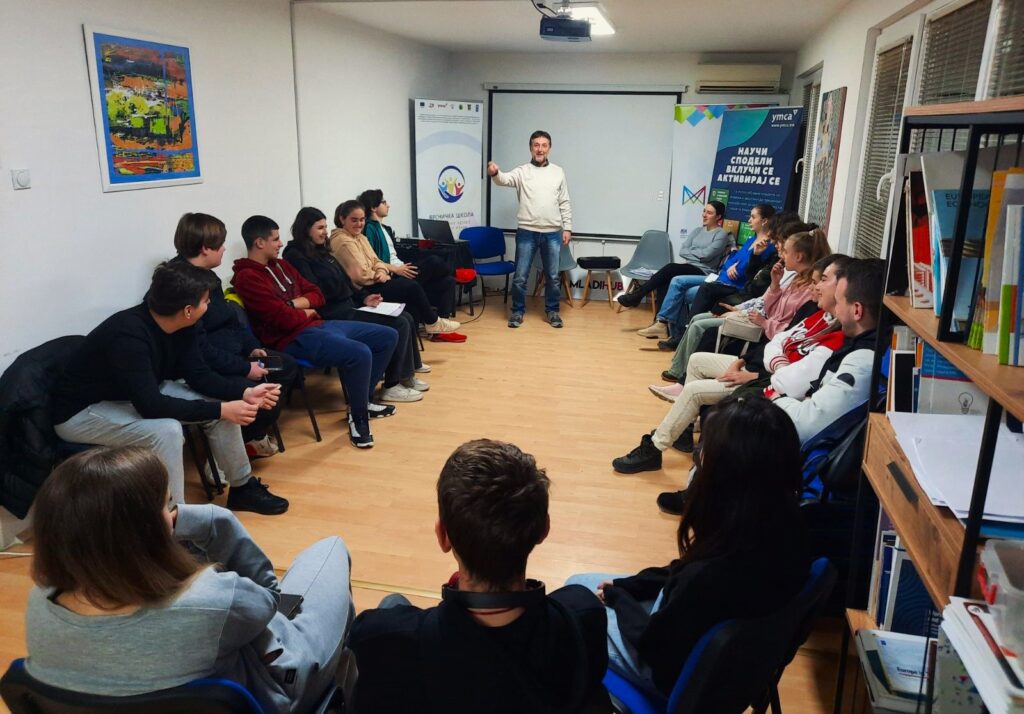
Throughout November and December last year, we implemented a series of workshops on mental health topics for peer educators from primary and secondary schools and faculties from Bitola. The first mental health workshop module was on the topic of anxiety and depression. According to experts in the field of psychological sciences, anxiety is a condition associated with the feeling of fear, and depression is a condition associated with the feeling of sadness. Recognizing them and developing personal strategies to deal with these conditions is what is necessary to maintain harmonious mental health. 58 peer educators divided into 5 groups of primary school and high school pupils and university students who were introduced to the topics of anxiety and depression completed this module. These topics were discussed including what they mean to young people’s conditions, what factors cause them, what the symptoms are, and how to help others and ourselves. The second module of mental health training was on the topic of risky forms of behavior. It was discussed what risk and risky behavior mean, how that behavior is related to the mental well-being of a person, what factors cause it, why it is a particularly significant phenomenon among young people and how young people can recognize the beginnings of risky behavior in themselves so they can help themselves and to recognize it in others. This module was completed by 48 peer educators divided into 5 groups of primary and high school pupils and university students who were acquainted with the topic of risky forms of behavior. During the training, it was discussed what these types of behaviors mean and how they manifest, how much they are present and in what forms in our everyday life in the schools of the city, how these conditions affect young people, what factors cause them and how we can help the others and to act preventively. The third module of mental health workshops was on the topic of building resistance, endurance and resilience. It was discussed what resilience means, how it is learned and how this ability is the most important factor in maintaining psycho-physical balance. This ability is the one that gathers our energies and directs them towards what makes the most sense at the given moment to overcome the situation we find ourselves in, survive and transform the experience we find ourselves in. This is what young people can learn to help themselves and help others. 42 peer educators divided into 5 groups of primary and high school pupils and university students who learned about the topic of building resistance, endurance and resilience completed this module. The peer educators discussed the ways to become resistant to ubiquitous negative influences in the external environment and surroundings, how to endure or cope with situations in which we are involved with or without our will and understanding ways to build lasting resilience and peace with self and others. The project „Peer school for children and youth mental health“ of the Youth Association YMCA Bitola has been implemented in the frames of the regional program for local democracy in Western Balkans2 Reload2, financed by the European Union (EU), implemented by United Nations Development Program (UNDP). The project is co-financed by the Municipality of Bitola. The project has been implemented by the YMCA in cooperation with Poraka Nova and Amos.
Beginning of the peer school for mental health of children and youth
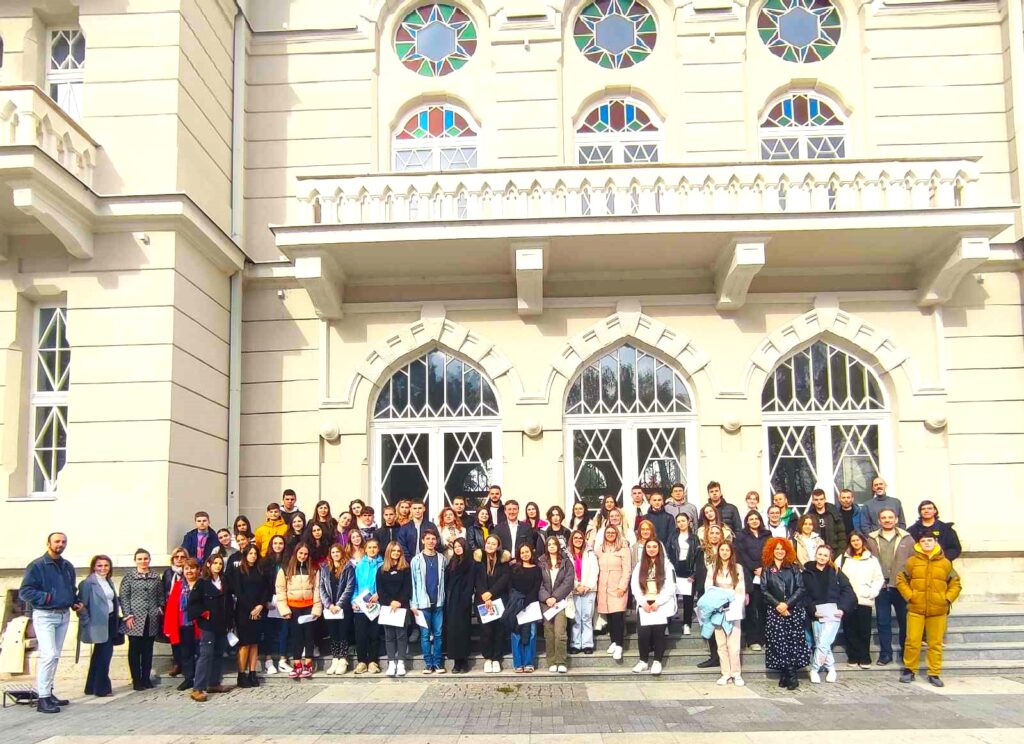
One of the most important elements of the project is the peer school itself, through which we plan to make a significantly large outreach of the topic of mental health. In the second half of September and October, we worked on the animation of the Bitola educational institutions with a focus on primary and secondary schools, as well as faculties. During this period we promoted the projects’ open calls and recruited elementary and high school students, as well as university students motivated to learn more about mental health for themselves and their peers in terms of recognizing certain conditions, but also how to act to help themselves and their peers from the community. We are done with this phase and it is time for action! Today’s event was just that. We gathered all peer educators, psychologists, pedagogues, and others from the professional services of the schools to mark the beginning of the project followed by an interesting program. The event introduced the participants to the planned activities and dynamics for the next period until the end of the school year. The distribution of peer educators’ groups was made based on age/generation and shifts of school to better plan the upcoming workshops in the direction of not missing and disrupting the regular teaching of schools and students. We formed five groups of peer educators, two of them with elementary school students, two with high school students and one with students. The groups had a series of tasks that they had to go through and familiarize themselves with the topic, get to know their peers with whom they will work in the next period, build their group identity and answer the introductory research on the topic to understand the their initial state on the topic of mental health. We also discussed the established channels of communication for the next period and all the formalities required for the smooth running of the upcoming workshops. The workshops will be based on the principles of non-formal education and will take place in the Youth Center in Bitola until the end of February. The peer educators will learn more and discuss with their peers about mental health covering topics such as: anxiety and depression, risky behavior, which means – violent behavior/peer violence, self-harm and substance abuse, building resilience and self-confidence among children and young people and the digital representation of the same topics related to the behavior of young people on social networks. The project has a follow-up phase in the second school semester where these peer educators will implement peer education workshops in their schools and faculties and share the gained knowledge with the end users/their peers in a non-formal setting. The project „Peer school for children and youth mental health“ of the Youth Association YMCA Bitola has been implemented in the frames of the regional program for local democracy in Western Balkans2 Reload2, financed by the European Union (EU), implemented by United Nations Development Program (UNDP). The project is co-financed by the Municipality of Bitola. The project has been implemented by the YMCA in cooperation with Poraka Nova and Amos. Read here to learn more about this project